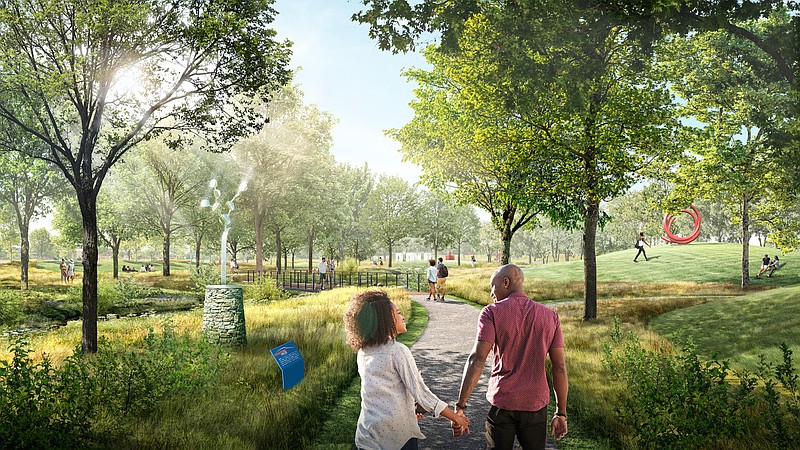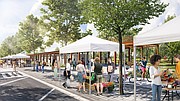After a monthslong planning process, Chattanooga leaders unveiled a new vision for Montague Park on Wednesday that they expect will foster harmony between the two long-term leaseholders and uplift an area poised for growth.
"I think they've uncorked the next great Southern urban park, and I did not expect that when we started," Parks Administrator Scott Martin said in an interview last week. "I did not see this coming, and now I can't get it out of my mind."
At about 46 acres, Montague Park is the largest piece of green space in the city's urban core, Martin said, and it was one of the original parks proposed in a 1911 plan developed for Chattanooga by landscape architect John Nolen.
Montague Park has two occupants: Sculpture Fields, a 33-acre outdoor art museum that features large-scale sculptures from around the world, and the Chattanooga Football Club Foundation, which has about 13 acres at the site for athletic programming, including youth sports.
"Our outdoors and our green spaces are our competitive advantage in Chattanooga," Mayor Tim Kelly said during an official unveiling of the plans Wednesday. "We can be an urban hub and an outdoor city all at the same time."
Under the plan, three new soccer fields would be developed on the stretch of parkland that borders 23rd Street. Those would also be available for concerts and sports such as lacrosse or rugby. The city also would plant more trees throughout the 46-acre site, turning the sculpture field into a sculpture garden.
(READ MORE: Chattanooga selects landscape architecture firm to reimagine Montague Park)
Designers also want to bring a market atmosphere to the space. Stretching along Polk Street, vendors will be able to set up booths across a lengthy public walkway that could include picnic areas, a splash pad, swings, lawn chairs and a space for community barbecues. There would be angled parking spots along the road, replacing those on the interior of the park.
A series of trails would circulate throughout property, including a mile-long walkway that would follow the park's outside edge. Ravines would be cut into the land around the sculpture gardens to assist with stormwater retention, although designers said that also will add visual interest by enabling the city to construct bridges over the waterways.
"We heard a lot when we talked with the surrounding property owners and surrounding people about localized flooding and stormwater concerns," Eric Myers, executive director of the Chattanooga Design Studio, said in an interview.
The heart of Montague would be a forested grove that will include play areas for children up to 12 years old. There would be a grand lawn similar to the one at Coolidge Park.
"You'd be in certain parts of this area of the park and not even feel like you're in a city, but you're in a woodland," Myers said.
The city is also looking at adding new pedestrian and cycling entryways to Montague Park, particularly on the eastern part of the property.
Initial estimates indicate the project could cost between $80 million and $100 million, Martin said, although those are not final.
The land was donated to the city about 100 years ago by the Montague family, and although officials envisioned turning it into a park at the time, that was initially shelved. In the late 1940s, the land was turned into a municipal landfill, which was ultimately capped and transformed into a ballfield complex in the latter half of the 20th century, according to a timeline on the Montague Park website.
The park was closed in 2003 after the state found methane gas emissions at the site and determined the original soil cap was inadequate. The property reopened about 10 years later, and John and Pamela Henry, the co-founders of Sculpture Fields, were the driving force behind making it an outdoor museum.
John Kett, managing partner with Reed-Hilderbrand, said in an interview the firm has been working with city officials and the Tennessee Department of Environment and Conservation to better understand existing conditions and how officials can safely mold the land to meet their goals. Kett said there's a lot of flexibility.
"There's a lot of misperception that's grown out of this over time, but what we're starting to realize is this place, actually, it can be safe for the community because all of this is contained within the cap that's under our feet," Kett said.
Kim Adams, chair of the Sculpture Fields board of directors, was involved in the planning process for the park, working alongside stakeholders like Clinica Medicos, the Chattanooga Design Studio, the Main Street Farmers Market and the Chattanooga Football Club Foundation. A steering committee chose Reed-Hilderbrand to act as the landscape architect for the project.
(READ MORE: Chattanooga may form 15-member parks advisory board)
Adams expects the new master plan will enhance the experience for visitors, also creating opportunities for Sculpture Fields to partner with the football club foundation on programs.
"This really did build a micro-community surrounding Montague Park," Adams said in a phone call.
Sculpture Fields and the Chattanooga Football Club Foundation have in the past been at odds about the appropriate use for the land. In 2021, Sculpture Fields opposed the city's decision to provide the foundation with a long-term lease on the 13 acres adjacent to its location at Montague Park. Both organizations said that conflict is over.
"Everything in the past is in the past," Adams said. "We have a lot in common. We both provide education, we both provide programs that are beneficial to the community. I think we found that we have more in common with them than we had before, which is the beauty of bringing two what you would think are disparate programs together. We actually found some synergy."
Krue Brock, director of the Chattanooga Football Club Foundation, said the organization has always wanted three fields at the site -- there's currently one -- but the design will place those pitches in a signature park. It also provides opportunities for cooperation with Sculpture Fields, enabling children involved in sports to more readily see works of art.
"It will not feel like a soccer complex," he said in a phone call. "It will feel like you're in a park. ... To me, it's more of a human, community-centered experience."
Dr. Kelly Arnold, the founder of Clinica Medicos, said more than 90% of the clinic's patients live below the federal poverty line.
The organization opened its doors at the corner of Holtzclaw Avenue and 23rd Street several years ago and recently broke ground on a new dental and mental health facility. Arnold sees many families from the surrounding community and envisions Montague Park as a space where people from different walks of life can gather.
"I look at it through the physician's lens in acknowledging that one of the most pressing and silent epidemics ... is isolation and loneliness, that really has impacts on individuals' health long term," Arnold said. "It's hard to feel lonely inside of a park."
Contact David Floyd at dfloyd@timesfreepress.com or 423-757-6249.

